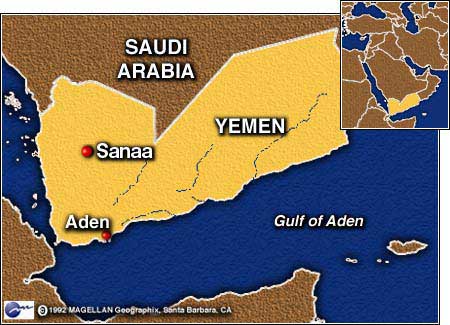Kestrel Wolgemuth writes for EA:
US Secretary of State John Kerry and Saudi Foreign Minister Adel al-Jubeir have proposed a five-day humanitarian ceasefire in Yemen to start on May 12. According to Kerry, the agreement would halt all airstrikes and ground operations, ensuring much-needed material aid reaches parts of the country hardest hit by violence.
The announcement comes after a marked increase in civilian casualties over the past week with continued Saudi-led airstrikes and an escalation in fighting between supporters of Ansar Allah (Houthis), who control the capital Sana’a, and backers of President Abdrabuh Mansour Hadi in the southern province of Aden. Saudi forces have formally declared the Ansar Allah area of Saada Province in northern Yemen a “military target”, following the death of several Saudis in cross-border shelling.
Coalition spokesman Ahmed al-Asiri said:
Our work now is reaching those [Houthis] who planned these attacks and who are hiding in Saada, and the places where the militias are. Our military operation will be longer and harsher, and will go after all Houthi commanders.
Humanitarian Crisis
Since the start of Saudi-led “Operation Decisive Storm” — later renamed “Operation Restoring Hope” — six weeks ago, at least 646 civilians have been killed, more than 1300 have been wounded, and 300,000 have been displaced. In the region’s poorest country, where 90% of food is imported during good times, a Saudi/Egyptian naval arms blockade and Ansar Allah-enforced road closures have resulted in dire shortages of food, water, and medical supplies. Perhaps the most pressing concern is a lack of fuel, with skyrocketing prices disrupting essential water pumps, transportation, and communications.
If commercial oil tankers were allowed to enter the port of Aden, and supplies were distributed efficiently, the pressure on the population would be eased. This is far from guaranteed, however. While food and bottled water shipments could pass through a relaxed blockade, oil could be considered too valuable to Houthi forces for Saudi Arabia to permit shipment. Even if the coalition granted access to all necessary supplies, Yemen’s infrastructure has been so badly eroded that relief efforts could take several weeks to ensure the most affected areas receive aid.
The Long-Term
All of this depends on whether a ceasefire can be agreed. Kerry and al-Jubeir are awaiting word from Ansar Allah and “their backers” — meaning Iran, though Tehran has yet to openly admit providing material support to the rebels. Al-Jubeir emphasized that a ceasefire would exist either “everywhere or nowhere”, implying that any act of aggression — whether or not it was linked to Ansar Allah — could be used as an excuse to resume operations. Should Ansar Allah attempt an advance to the south, any ceasefire would quickly collapse.
Saudi Arabia has shown an increasing willingness to act autonomously in the face of American disapproval — albeit subdued disapproval that still comes with logistical support — and the recent promotion of Muhammad bin Nayef and Muhammad bin Salman to Crown Prince and Deputy Crown Prince signals a continued hawkish approach to Yemen.
If the best-case scenario should come to pass and a ceasefire holds, what are the next steps? The Houthis have repeatedly professed a willingness to engage in negotiations, though who should oversee peace talks remains a point of contention. Past dialogues have ended in failure, and if Saudi Arabia maintains its commitment to restoring Hadi to power, political stalemate could usher in yet another wave of fighting.

